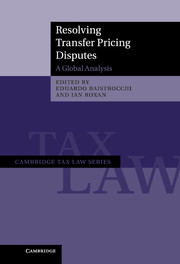Book contents
- Frontmatter
- Contents
- List of figures
- List of tables
- List of contributors
- Acknowledgements
- The Golden Bridge: analytical table of cases by topics in the OECD Guidelines
- Table of Cases
- Abbreviations
- Part I The context of transfer pricing disputes
- Part II North America and Europe
- Part III Asia Pacific
- 9 Transfer pricing disputes in Australia
- 10 Transfer pricing disputes in Japan
- 11 Transfer pricing disputes in the Republic of Korea
- 12 Transfer pricing disputes in Singapore
- Part IV BRIC Countries
- Part V South America, Middle East and Africa
- Part VI Conclusion
- Index
- References
10 - Transfer pricing disputes in Japan
from Part III - Asia Pacific
Published online by Cambridge University Press: 05 November 2014
- Frontmatter
- Contents
- List of figures
- List of tables
- List of contributors
- Acknowledgements
- The Golden Bridge: analytical table of cases by topics in the OECD Guidelines
- Table of Cases
- Abbreviations
- Part I The context of transfer pricing disputes
- Part II North America and Europe
- Part III Asia Pacific
- 9 Transfer pricing disputes in Australia
- 10 Transfer pricing disputes in Japan
- 11 Transfer pricing disputes in the Republic of Korea
- 12 Transfer pricing disputes in Singapore
- Part IV BRIC Countries
- Part V South America, Middle East and Africa
- Part VI Conclusion
- Index
- References
Summary
Introduction
In December 1985 the Tax Commission, an advisory body to the Prime Minister, submitted its report on the revision of the tax system for 1986, recommending as follows:
As the recent internationalization of business progresses, the shifting of income abroad by manipulating prices in transactions with overseas specially related enterprises, that is, the problem of transfer pricing, has become important in the area of international taxation. It is difficult to deal with this matter sufficiently under the present law. Leaving this situation as is would be problematical from the viewpoint of proper, equitable taxation. Considering the fact that foreign countries are already equipped with a tax system to deal with such shifting of income overseas, it would be appropriate to stand on common ground with these foreign countries and to formulate provisions concerning the computation of taxable income to apply to corporations' transactions with their specifically related enterprises abroad, as well as to create measures contributing to the smooth operation of such a system, such as the collection of data, in order to realize proper international taxation.
Based on this recommendation, the Japanese international transfer pricing rules were enacted and codified as article 66-5 (later renumbered as article 66-4) of the Special Taxation Measures Law (STML) on 28 March 1986, with two principal purposes: to cope with the shifting of income abroad and to put Japan's tax system on a common ground with those of other nations.
- Type
- Chapter
- Information
- Resolving Transfer Pricing DisputesA Global Analysis, pp. 415 - 438Publisher: Cambridge University PressPrint publication year: 2012

